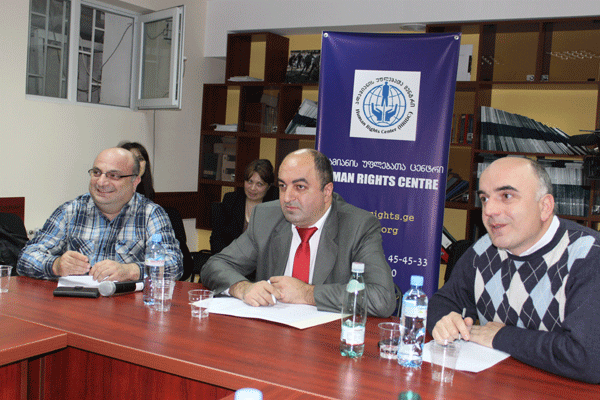Nino Akhobadze
On October 29th, the public discussion – Human Rights - Instrument for Rebuilding Trust and Mutual Cooperation – was held in the conference hall of Human Rights House Tbilisi in the frameworks of the project financed by Norwegian Helsinki Committee – Coalition for Rebuilding Trust.
Human Rights Center, partner organization of Norwegian Helsinki Committee along with Civic Movement Multinational Georgia in the project Coalition for Rebuilding Trust, organized the public discussion.
Human Rights Center considers that human rights protection can be one of the contact points for Georgian, Abkhazian and Ossetian societies in the situation when it is particularly important to activate process of rebuilding trust, reconciliation and peace-building.
“Human rights defenders must think more about the state of human rights in the unrecognized Republics and separate this topic from politics as much as possible. The political issues like the status of Abkhazia and South Ossetia might hinder the process of mutual cooperation and rebuilding trust as our opinions might differ about these issues. However, we all agree that humans need protection because they are the highest value and we can jointly fight for the protection of human rights,” – head of Human Rights Center Aleko Tskitishvili noted.
The public discussion covered issues of human rights in Abkhazia and South Ossetia and obstacles which hinder human rights defenders from Georgia, Abkhazia and Ossetia to cooperate and jointly protect human rights.
Ombudsman of Georgia, Ucha Nanuashvili, who was the main speaker at the discussion paid attention to the problems existing in the near-conflict villages surrounding the dividing line along the breakaway South Ossetian region. He talked about the severe poverty in the village Zardiaantkari which is located in 25 kilometers from Gori.
“People could not leave the village during the 2008 war and they found shelter in the kindergartens in Gori. Till 2012, Georgian government could not control this territory. However, in 2012 Georgian police entered the village. Some people, mainly elders, went back to their homes. However, the rest 27 families cannot manage to go back due to the lack of safety and severe social problems. They are still living in Gori in the kindergarten building. Many of them are requesting long-term resettlement and compensation.”
According to the Ombudsman, the issue of prisoners remains to be urgent problem. There are 7 ethnic Ossetians placed in Tbilisi and Rustavi prisons and 6 Georgian prisoners in the prison in Tskhinvali.
Ombudsman noted that despite certain hopes for the exchange of prisoners, the issue of prisoners is still uncertain and no concrete steps have been taken yet except for the release of Marek Dudaev last year, as a result of the amnesty. Ossetian side released prisoner Jarapov as a response to this action.
According to Ombudsman, Georgian citizens living in Abkhazia and South Ossetia come across problems when applying for health services within the frames of the state programs for referral services.
“If the issues of the patients were discussed by the request of the Minister of Reconciliation and Civic Equality up until now, now the cases are discussed by the special commission for the referral services, the so-called referral commission. But, the state no longer makes requests for the Georgian citizens living in the occupied territories and explains this by the decision of the commission.”
The representative of civil society from Tskhinvali Irina Yanovskaia participated in the discussion via skype. She briefly reviewed human rights state in South Ossetia and paid particular attention to socio-economic issues, violation of labor rights and issues of justice. According to her, the trials are often protracted in Tskhinvali which is a serious problem.
Irina Yanovskaia paid particular attention to the disappearance of some ethnic Ossetians in Georgia who disappeared after 2008 August war and their whereabouts are still unknown. She asked Ombudsman what concrete steps have been taken to investigate these cases. Ucha Nanuashvili responded that he addressed relevant bodies several times but they did not provide any concrete information.
The head of the Coalition for IDP Rights, Zurab Bendianishvili presented the issue – Examples of Mutual Cooperation and Future Perspectives at the discussion. He spoke about the lack of international mechanisms which would have promoted cooperation of Georgian, Ossetian and Abkhazian sides in the issues of human rights.
At the end of the meeting Aleko Tskitishvili noted that these kinds of discussions will bring closer Georgian, Ossetian and Abkhazian human rights defenders. He also noted that these discussions must not be merely formal and the important issues noted during the discussion must be actively advocated.
News
December 13, 2023
Ethnic minorities outside the peace dialogue
November 6, 2023
‘Peace’ agenda of political parties
Popular
Articles
February 13, 2024




